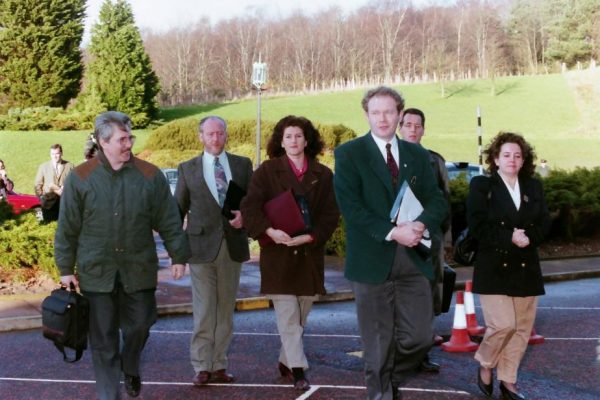
Martin McGuinness leading Sinn Fein delegation to Stormont talks
The State papers detail that there were “hard-hitting exchanges” during a meeting between a delegation led by Martin McGuinness and Northern Ireland Office Michael Ancram which took place in May 1995.
A series of once-secret official papers from the 1990s have been released by the Public Record Office in Belfast today.
They have been declassified under the 20-year rule.
The papers focus on 1995, as the peace process continued in the North of Ireland following the August 1994 IRA ceasefire.
One note, from Jonathan Stephens on May 10, 1995 on exploratory dialogue, details a three-hour meeting between a Sinn Fein group led by Mr McGuinness, the party’s chief negotiator, and Mr Ancram, who was Minister of State at the NIO.
The summary of the session said it had “frank, hard-hitting exchanges. Michael Ancram explained why substantial progress on the issue of decommissioning was essential”.
It added: “Sinn Fein repeated their commitment to the principle of removing all guns from Irish politics. Mr McGuinness took a Government paper on modalities of decommissioning, and agreed to consider it.
“Mr McGuinness repeated demands for equality of treatment with other parties.
“He refused to agree a date for a further meeting with Michael Ancram, insisting on a response to his formal request for a meeting between the Secretary of State and Mr Adams as part of the round of bilaterals with the other main parties.
“Demilitarisation and prisons were also briefly touched upon.”
The finer detail reveals that McGuinness opened the meeting with Shakespeare and said: “Once more into the breach…”
The record then states: “In response to a suggestion from Michael Ancram that discussion should now move to decommissioning of arms, Mr McGuinness asked why this should take priority: it had never featured before August 31 1994.
“Michael Ancram explained: it was part of meeting the requirement of paragraph 10 of the Downing Street Declaration. It was also a matter of political reality that there would be no round table talks without addressing the issue. The Taoiseach had made this very clear in the Dail recently.”
The memo notes how, in a lengthy preliminary discussion, Mr McGuinness said:
* Sinn Fein were “wholly committed” to the removal of all guns, including IRA guns.
* The IRA “had taken an enormous step in declaring its cessation of violence” but his judgment was that there was no possibility of the IRA handing over weapons now, or handing them over unilaterally at any stage.
” if it had been clear that this was a pre-condition to progress, there most likely would have been no IRA ceasefire.
*It would be “unrealistic” to expect Sinn Fein to bring about the IRA’s surrender. “They simply could not deliver that,” he said.
* He had “serious doubts” about the Government’s resolve to move the process forward. Decommissioning, he added, was being used as a stalling tactic and as an excuse for denying Sinn Fein equality of treatment. Mr McGuinness said the republican leadership “had put their necks on the line and taken significantly more risks than anyone else”, and feared the Government now wanted to hang them out to dry.
* He asked why were the same questions not being asked of Ian Paisley, the then DUP leader, and his relationship with the armed Ulster Resistance?
In response Mr Ancram said “decommissioning was not a hurdle which the Government was seeking to erect… the practical reality was that most other parties would not sit down with Sinn Fein until substantial progress on the issue was made”.
The record continued: “We were not seeking the IRA’s surrender but the issue could not be ducked.
“We wanted to make progress in a number of parallel areas, including further de-escalatory measures and political progress, but part of this process had to be progress on decommissioning.”
The memo details how the discussion then turned to the modalities of decommissioning.
Mr Ancram ran through the possibilities of verification, independent supervision, methods and legal and practical considerations, emphasising that the Government had an open mind on such issues as the involvement of third parties and the establishment of a commission, reporting to both Governments, if necessary with overseas representation.
“Mr McGuinness said that Sinn Fein had given no detailed consideration to these sorts of issues,” he added.
“Their position was that if the right political conditions were created in which the relevant organisations had the confidence to decommission arms, the then logistics of the process would be a very simple matter to agree.
“He agreed to accept a Government paper on the issue, which was then handed over, and undertook to consider it personally.”
The IRA ceasefire of 1994 lasted until the London Docklands bomb in February 1996.
In July 1997 the IRA announced a second, lasting ceasefire.
A new round of peace talks, including Sinn Fein, resumed two months later in September. None of the five unionist or loyalist parties attended and attempted to get Sinn Fein excluded.
Talks continued at Stormont as David Trimble and the UUP began to participate.
Negotiations and sporadic violence by loyalist and republican splinter groups continued until the Good Friday Agreement was signed in May 1998.
Tags:




